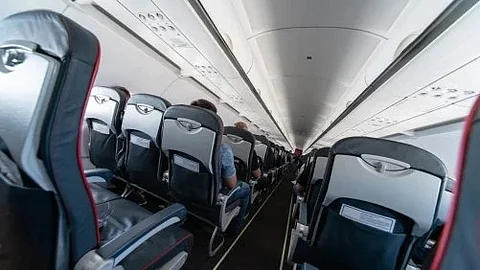
- HOME
- OPINION
- ON GROUND
- INTERVIEW
- INDIA
- NewsGram USA
- WORLD
- न्यूजग्राम
- POLITICS
- ENTERTAINMENT
- CULTURE
- LIFESTYLE
- ECONOMY
- SPORTS
- Jobs / Internships
- Misc.
- NewsGram Exclusive

Air India Crash: The horrendous images of the Air India plane that crashed today, killing at least 200 of the 242 people who were aboard, are likely to escalate anxiety among many who have an intense fear of flying, say mental health experts.
Some 25 million people in the U.S., and about 40 percent of those living in industrialized nations, have an intense fear of flying, called aerophobia or aviophobia.
When tragedies–or incidents that could have been tragic–grab the headlines, that fear is triggered, bringing to the fore the worst-case scenario that many who experience aerophobia may push aside or dial down at other times.
"For people with aerophobia, or fear of flying, news of a plane crash can be certainly triggering and reinforce an already heightened sense of vulnerability," says Dr. Gary Small, chair of psychiatry at Hackensack University Medical Center and author of more than a dozen books on mental health. “Even though flying remains statistically one of the safest forms of travel, people with this phobia often struggle with a perceived lack of control, fear of enclosed spaces, or catastrophic thinking—believing that the worst-case scenario will happen to them."
"When a crash makes headlines, it can feel like proof that their fear is justified, even if the event is incredibly rare.”
Aviation experts note that flying continues to be among the safest modes of transportation, and has been steadily improving. Massachusetts Institute of Technology researchers noted in a report last year that the risk of dying from commercial air travel was 1 per every 13.7 million passenger boardings globally in the 2018 to 2022 period.
"When a crash dominates the news, it can intensify those fears and even cause setbacks in progress for those working to overcome them,” Dr. Small says. “I encourage people to take breaks from media coverage, focus on what’s within their control, and use grounding techniques. Therapy—especially cognitive behavioral therapy—can help reframe fearful thoughts, and in some cases, medication can offer additional support during high-anxiety moments."
To cope with fear of flying, Hackensack Meridian Health mental health experts also advise:
1.) Cognitive Restructuring: Gently challenge irrational beliefs about the dangers of flying by replacing such beliefs with factual information about flying. Redirect your negative thoughts to focus on positive things, such as what you are looking forward to when you reach your destination. Also, avoid “doomscrolling” or immersing yourself in news about crashes.
2) Relaxation Techniques: Deep breathing is a highly efficient tool to manage fear and anxiety. Deep breathing slows down our body's stress response system and evokes a sense of peace and calm. Practice deep breathing along with saying a soothing word, such as "calm" or "peace" to yourself during the flight.
3) Cope Ahead: Mentally visualize yourself on the airplane ahead of time. Picture yourself feeling comfortable and relaxed. The more detailed the image, the better. Picture what you will be doing as you feel relaxed, perhaps reading a book or drifting off to sleep. Imagine the feelings of the airplane landing and you exiting the plane.
4) Distraction: Distraction is a great tool to use when our mind is producing a lot of worrisome, unhelpful thoughts. When our mind is stuck in the worry loop, it is best to break the cycle by focusing on anything other than the anxiety provoking thought. This can include simple mental exercises such as counting backwards in your head, crossword puzzles, counting items around you, etc.
5) Support: Rely on a trusted travel companion to come with you on the flight. Be honest about your fears and share what you think may be helpful for you if you start to feel afraid.
6) Gradual Exposure: Begin with shorter, manageable flights or engage in a simulated airplane flight experience, which will gradually expose yourself to the experience of flying, desensitizing your fear response over time.
7) Seek professional help: Seek help from a therapist trained in evidence based treatments, such Cognitive Behavior Therapy or Exposure Therapy, to overcome anxiety and fears associated with flying. Newswise/SP
